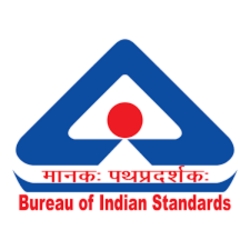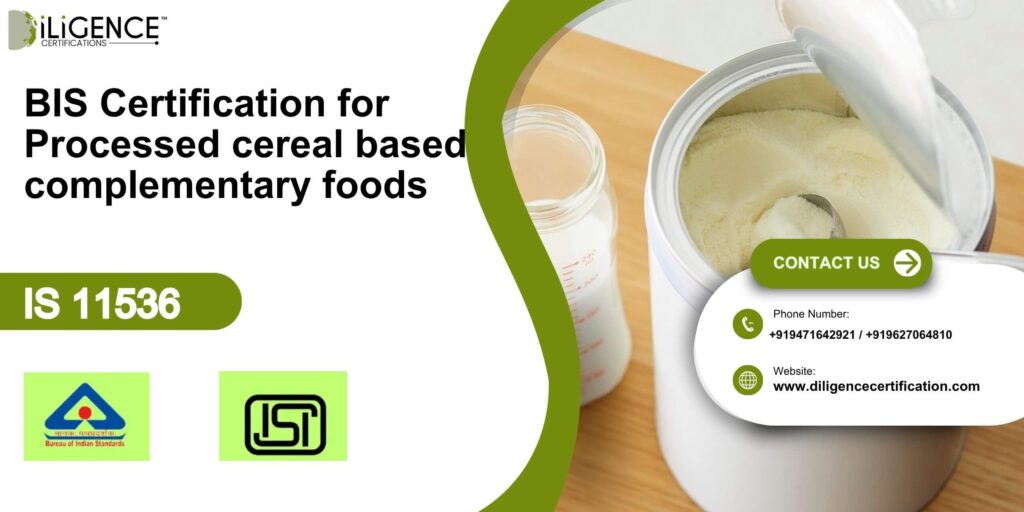- Confirms that processed cereal-based complementary foods for infants are in accordance with India safety and nutritional standards.
- It is a must-have certificate for the manufacturers, importers, and sellers of such products in India that is governed by the BIS regulations.
- This basically covers the areas of nutrient composition, microbiological safety, packaging, and labeling compliance.
- It is used to build consumer confidence and to increase brand value in the infant nutrition market.
- Through this, a company ensures continuous quality check that leads not only to a better legal market access but also to the long-term brand reputation.
Introduction
BIS Certification for Processed Cereal Based Complementary Foods under IS 11536 is necessary for manufacturers of infant nutrition products in India. A baby food brand from Chennai was recently at the receiving end of a retail rejection as their processed cereal-based complementary food did not carry this certification. BIS Certification is the means that can be used for the products to attain tough safety, nutritional, and quality standards. It is not only the validation of the production and hygiene practices but also the building of trust with parents and retailers.
What is BIS Certification for Processed cereal based complementary foods under IS 11536

BIS (Bureau of Indian Standards) certification is one of the various types of processed cereal-based complementary foods as per the IS 11536 standard. This certification of infant foods is a token of the nutritional, safety, and quality standards corresponding to company product requirements.
Some of the principal features of this certification are those processed cereal-based complementary foods should additionally:
- Be in line with the definitions of the nutrient composition such as proteins, carbohydrates, fats, vitamins, and minerals.
- Maintain very strict microbial safety standards so that no disease-causing organisms are introduced into infants.
- Witness good packaging, labeling, and storage as per the standards laid down.
- Make the change easier from the safe and controlled quality processes.
What is IS 11536?

IS 11536 is the Indian Standard that specifies the characteristics, both from a performance and a test perspective, for infant cereal-based complementary food products made of processed raw materials intended for infants over six months of age. This standard is released by the Bureau of Indian Standards (BIS) to ensure that such products are safe, nutritionally adequate, and of good quality.ISI MARK
IS 11536 fundamental principles are:
- Nutritional Composition: specifies the numbers of proteins, fats, carbohydrates, vitamins, and minerals that should be present in the nutrition of infants with the permissible range of the content from the minimum to the maximum limit.
- Microbiological Safety: defines the permissible limits of the microorganisms that are totally viable bacteria, pathogenic bacteria, yeasts, and molds in foods without causing any health risk to humans.
- Packaging and Labeling: Moreover, besides usage instructions and warnings for allergens, storage, age and usage recommendations, and allergen information should be offered in a simple and easily understandable layout.
- Manufacturing Standards: concerns the making of clean and hygienic commodities, quality control, and batch traceability.
Who need BIS Certification for Processed cereal based complementary foods under IS 11536
BIS Certification for Processed Cereal Based Complementary Foods under IS 11536 is necessary for:
- Producers of processed cereal-based complementary foods for infants over six months of age.
- Learners of such products in the Indian market.
- Manufacturers of contracted or third-party fabricated goods having proprietary or third-party labels.
- Sellers who desire to signal to the international buyers their adherence to the quality standards.
- Companies that sell, distribute, or retail these infant foods in India, intending to enter the market.
Key features of BIS Certification
Here are the key features of BIS Certification for Processed Cereal Based Complementary Foods under IS 11536:
- To begin with, through this certification, one can check if safety, nutritional, and quality standards set by India for infant foods are followed.
- In the next place, it is a confirmation of the product’s nutrient composition through the diverse analyses of proteins, carbohydrates, fats, vitamins, and minerals.
- Furthermore, from the point of view of microbiology, it is a safety guarantee, which means that the presence of the harmful bacteria and contaminants has been reduced to a minimum level.
- Besides, it could also guarantee packaging and labeling standardization, where there are also very detailed instructions regarding preparation, storage, and age of the product used.
- Next to this, it also includes the plant and the quality management system performance inspections for the maintenance of the prescribed standards.
- Moreover, it is a certification that enables the consumers (the buyers) to have faith in the company and consequently, it is a plus for them in the infant nutrition market.
- It is important to remember that BIS Certification is also a must for the legal manufacture, sale, and distribution in India.

Step by Step process of BIS Certification for Processed cereal based complementary foods
Step1: Application Submission
- Send Form-I to BIS along with the product description, product formulation sheets, and the relevant test reports.
- Also, provide details about the manufacturing plants and the quality control systems you use.
Step2: Document Verification
- BIS checks the documents submitted by the applicant to see if they are complete and meet IS 11536 requirements.
- If there are any discrepancies, the parties responsible for the documents are informed of the necessary corrections.
Step3: Sample Testing
- BIS can ask for product samples to be tested in a laboratory certified by the BIS or accredited by NABL.
- The tests include nutrient composition, water activity, contaminants, and microbial safety.
Step4: Factory Inspection
- BIS does a factory inspection to confirm the standards at the production site.
- Checks the aspects of cleanliness, raw material receiving, process control, and record maintenance.
Step5: Evaluation and Approval
- BIS goes through the lab test results and the factory audit reports.
- If found in conformity, the use of the BIS Standard Mark license is granted.
Step6: Post-Certification Surveillance
- BIS carries out follow-up inspections and sample testing from time to time to make sure that there is compliance with IS 11536.
Benefits of receiving BIS Certification for Processed cereal based complementary foods
- Regulatory Compliance: In other words, the product is allowed to be made, sold, or distributed in India in a legal way.
- Consumer Trust: The BIS mark gives an assurance to the parents that the food is safe, healthy, and can be relied upon.
- Market Credibility: In this way, the brand can become more visible to the retail stores, thereby increasing the number of potential customers.
- Quality Assurance: The product is also a confirmation that it has been made with the observance of the strict manufacturing, sanitation, and quality control standards.
- Competitive Advantage: Companies can capitalize on this resource to attract new consumers and create loyalty with return customers in the infant nutrition sector.
- Export Opportunities: It facilitates the establishment of relationships with international buyers and entry into foreign markets.
- Consistent Product Quality: This is one of the most important factors in maintaining high standards during audits and when samples are taken.
Timelines, Costs, Validity & Renewal
- Timelines: Usually the duration of the whole procedure is between 3 and 6 months, which covers application processing, the sample testing, and the factory inspection.
- Costs: The cost of the service is made up of application and license fees, laboratory testing charges, and an optional consultancy fee for documentation support.
- Validity: Certificate of conformity is generally kept for 2 to 3 years.
- Renewal: It includes the delivery of the new test results, the confirmation that processes have not changed, payment of renewal fees, and, possibly, a factory visit for a scheduled audit.
Why choose Diligence Certification
- Experience with BIS Compliance: The main point is their long practice in providing a detailed orientation to producers of IS 11536 standards.
- Complete Support: The company offers help in the preparation of needed documents, testing of samples, inspections of factories, and even in the process of getting a license.
- Shorter Waiting Periods: The different stages can be done quicker and with less hassle due to their pre-audit advice and the elimination of some of the steps in the process.
- High Level of Safety: This company makes sure that the product is safe and meets all requirements in the set standards before it is submitted.
- Experience and Confidence: They are relied upon by infant nutrition brands to lead the process of BIS certification to success.
- Continuous Support: The company will facilitate renewals of the license and will keep the client abreast of changes in regulations and quality control exercises.
Conclusion
BIS certification under IS 11536 for processed cereal based complementary foods is the basic requirement that guarantees the product’s safety, nutritional adequacy and compliance with the regulations in India. It is a sort of ‘giving the finger of trust’ to parents and the retail sector while increasing the brand’s reputation in the market. For the companies it is an important step for the legal and long-term development of their business. The collaboration with Diligence Certifications makes the journey very simple – from paperwork, laboratory tests to factory visits and endorsements – your products will be of the highest standards and will be considered the best in the infant nutrition sector.
Frequently Ask Questions
What Is BIS Certification for Processed Cereal Based Complementary Foods under IS 11536?
BIS Certification is the consent authorized by the Bureau of Indian Standards to show that processed cereal-based complementary foods are kept in safety, nutritional, and quality requirements specified in IS 11536.
Who should get BIS Certification as per IS 11536?
Manufacturers of processed cereal-based complementary foods for infants whose products are targeted to the Indian market are the first that should get this certification. Besides them, the importers, contract producers, and exporters can also obtain this certificate.
What is IS 11536?
IS 11536 is Indian Standard specifying the nutritional content, microbiological safety, packaging, labeling, and manufacturing requirements of processed cereal-based complementary foods for infants over six months.
What are the key requirements under IS 11536?
The products must supply the necessary nutrient levels adequately and must have low microbial contamination. They should be produced following good hygienic practices. Besides that, they must be packaged and labeled in such a way that ensures the safety of the use.
How long is the BIS Certification process?
Typically, the duration of the BIS certification process is 3-6 months in total. The time is split into various steps such as application review, sample testing, and factory inspection.
What are the costs involved in obtaining BIS Certification?
The price for the certification is made up of several fees such as the one for application and licensing, laboratory testing, and, in case of employing consultancy services for documentation and guidance in the process, a payment for such services as well.
How long is BIS Certification valid, and how is it revalidated?
By and large, the period during which the product has a certificate is 2 to 3 years. It requires obtaining new test reports, verifying that the production processes have not been changed, making a renewal payment, and also getting a surprise visit.
What are the benefits of BIS Certification?
BIS certification opens the door to you advantages which are the following ones:
compliance with the standards, public trust, your brand promotion due to the heightened trust, market access along with the quality control that is your company being under regular inspection, and more.
What is the step-by-step process to apply for BIS Certification under IS 11536?
Steps include application submission, document verification, sample testing, factory inspection, evaluation, license issuance, and post-certification surveillance.
How can Diligence Certifications help?
Diligence Certifications provides expert guidance on documentation, testing, pre-audit checks, factory inspections, and renewal support to ensure smooth BIS certification and compliance with IS 11536.








 BIS Certification
BIS Certification
 CDSCO
CDSCO
 CPCB
CPCB
 LMPC
LMPC
 WPC Approval
WPC Approval
 Global Approvals
Global Approvals
 TEC
TEC
 ARAI
ARAI
 BEE
BEE
 ISO Certification
ISO Certification
 DGCA Certification
DGCA Certification
 NOC For Steel
NOC For Steel



















 Business Registration
Business Registration















 Legal Services
Legal Services
 Trademark Registration
Trademark Registration
 Copyright Registration
Copyright Registration
 Patent Registration
Patent Registration















































